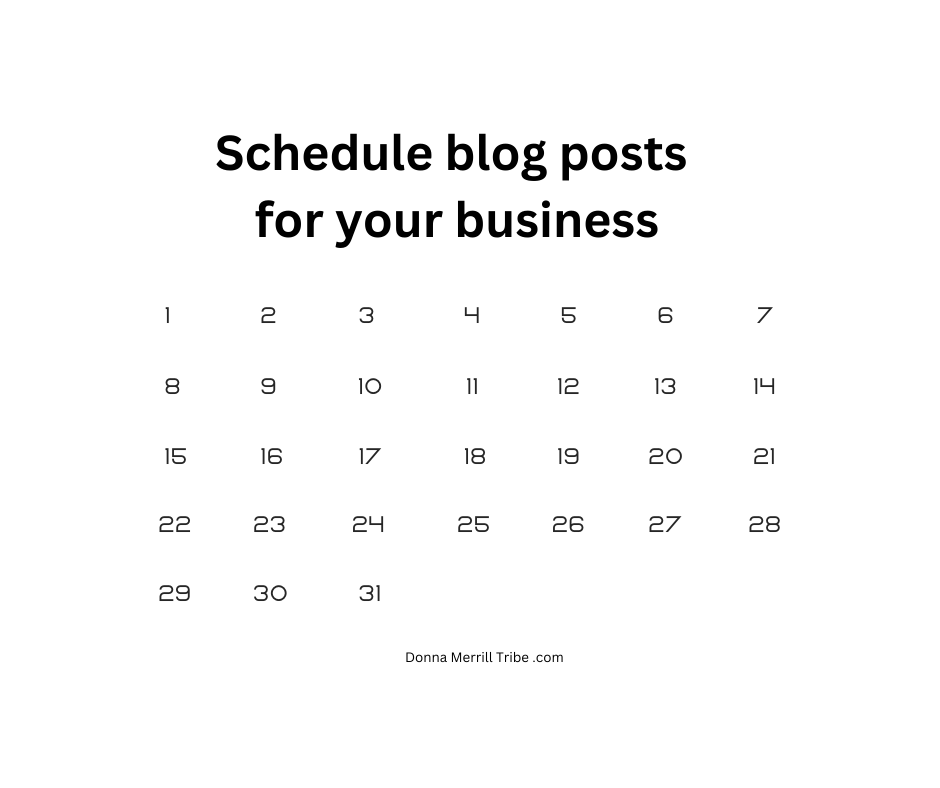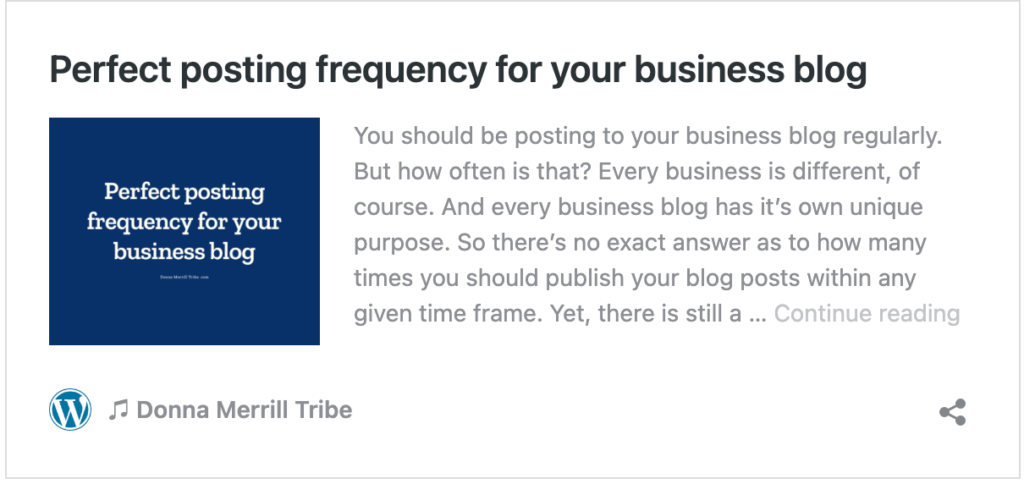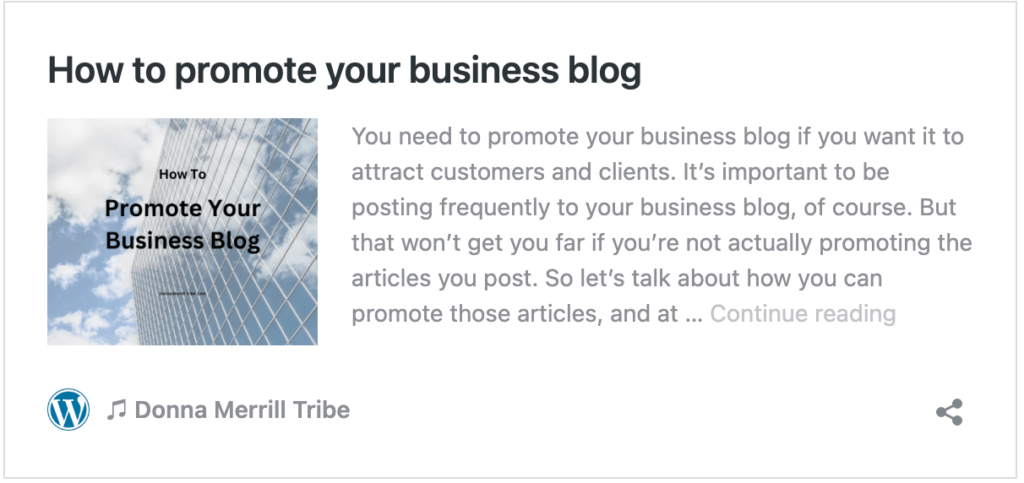
You should schedule your business blog posts according to your business goals.
A blog is a great way to connect with readers who are good prospects for your products and services.
But you have to let them know you have information to help them actually purchase your products or hire your services.
There is a process for bringing people along a path that starts with becoming aware of your business, up to the point of becoming a loyal customer and advocate.
Digital marketers call this path a “sales funnel.”
So, when you schedule your business blog posts, consider what the actual purpose of that post will be.
The purpose of each business blog post can be one of several things.
It really depends on what stage of the sales funnel it’s in.
Sales funnel stages
You should schedule business blog posts to be distributed somewhat evenly among the sales funnel stages.
That way, you will always be addressing the immediate concerns and specific interests of your prospects no matter where those concerns and interests lie within the sales funnel process.
You can come up with many ideas for writing blog posts for your business, but knowing where they belong within your sales funnel is the key.
Awareness blog posts
You need to schedule some of your business blog posts to address the concerns of readers in the “Awareness” stage of the sales funnel.
There are several ways you can slant these articles.
One way is to make people familiar with your products or services.

In other words, to make sure they’re aware of who you are.
These might be called “awareness” blog posts.
These blog posts should be geared toward solving a problem that readers in your target audience struggle with.
So, let’s say you’re an attorney specializing in automobile accident injuries.
Your readers will probably click on your article if it has a title like “Should I sue for injuries from an automobile accident?”
Now, that’s a common concern among people who your business serves.
So you’ll schedule some business blog posts to answer that question, and give details about the process of suing parties involved in automobile accidents.
Then you’ll make them aware of the fact that your company can help them to start a lawsuit for injuries they may have suffered.
Consideration blog posts
In the next stage of the sales funnel, people who you’ve already made aware of your services, will want to consider whether or not to contact you for a consultation.
You want to schedule business blog posts in this “Consideration” stage of the sales funnel to give people a better idea as to how well you can serve them.
And you’ll also want to let them know how your services stack up against your competitors.
So this article will go into some detail as to what an accident-related lawsuit entails.
And more, particularly, it will demonstrate your own professional abilities, experience and strengths.
Consideration stage blog posts will typically strive to convince your readers that you are the right person to do business with.
An example of a title for a blog post you can schedule at this point in the sales funnel could be something like “How to collect the most money for your personal injury lawsuit.”
Conversion blog posts
You also need to schedule business blog posts that speak to people in the “Conversion” stage of the sales funnel.
These blog posts specifically seek to get people to take a specific “conversion” action.
That could mean, to
- call you
- email you
- join your email list
- watch your sales video
- sign up for your webinar, or
- any other “conversion” action you want them to take.
So your conversion blog posts will be geared to getting people to take action.
They will have specific CTA’s or Calls-To-Action embedded in them.
For instance, “sign up here to get my free report, 3 steps to starting a personal injury lawsuit.”
Or it might be as simple as, “Call this number for your free phone consultation.”
Again, it could be anything.

The point is that your blog post should give your readers a good reason to take you up on your Call-To-Action offer.
You might, for instance, schedule some blog posts that go over exactly what you can tell people during a 15 minute free consultation phone call.
Within those blog posts, you’ll actually suggest that they set up an appointment for that free consultation.
Your goal is to get them to take that specific conversion action.
You might also schedule blog posts that help your business sell a product that it offers.
Within those articles, you could actually ask them to simply click a button to “Buy Now.”
What kind of conversion goals does your business have?
That’s the first question you‘ll need to consider when scheduling your business blog posts for this stage of the sales funnel.
Loyalty blog posts
Once you’ve actually “converted” someone to buying your product or hiring you for a service, you’ll want to schedule those business blog posts that go a step further than simply convincing them to become single-purchase customers or clients.
You’ll want to schedule business blog posts for this “Loyalty” stage of the sales funnel to steer them toward becoming “loyal” customers and clients.
You see, it takes a lot of effort and investment of your resources to get someone to take the big step of going beyond considering your products and services, to becoming an actual paying customer or client.
So the next thing you want them to do is to keep buying your products, using your services, and recommending your business to other people they know, or are connected to in some way.
The best method for building customer loyalty is to write highly valuable content.
So be sure to schedule business blog posts that directly answer the questions your readers might typically ask.
Give them solutions to their biggest problems.
In other words, schedule blog posts that will improve the lives of your target audience.
That will keep them reading your blog on a regular basis.
And it will also inspire them to tell others about your blog.
They’ll become brand ambassadors when they share your blog posts, interact with you on social media and engage with you wherever you are actively involved.
Be sure to share your articles on social media, and join in on social media conversations related to your expertise.
All these things will give you a great opportunity to build stronger relationships with your customers, make them loyal to your business and give them reason to become avid brand ambassadors of your business.
How to schedule blog posts for your business
Scheduling blog posts for your business requires careful consideration.
Think carefully what the goals of your business are.
Then figure out how your blog posts can help you achieve those goals according to the various stages of the sales funnel your readers will be at.
Now, I’d like to hear from you.
Leave me a comment below.
Tell me, what are the goals of your business?
How can your blog help you achieve them?
To accomplish this, what do you think is the best strategy for you to schedule your business blog posts?
–Donna
PS: Please share this article on your favorite social sites!
Author information
The post How to schedule blog posts for your business appeared first on ♫ Donna Merrill Tribe.